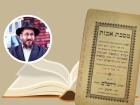Why Learning Pirkei Avos Each Week Is Important
Rabbi Gershon Avtzon writes: Since I was a child, I have had a fascination with Pirkei Avos. The clear, holy and ethical directives of our holy Tannaim spoke to my heart… When encouraged to learn Mishnayos by heart, my parents started with the Masechta of Avos. I looked forward to the spring and summer months in which we learn a perek of Pirkei Avos each week • Full Article
By Rabbi Gershon Avtzon
Since I was a child, I have had a fascination with Pirkei Avos. The clear, holy and ethical directives of our holy Tannaim spoke to my heart. In addition: The Gemara (Bava Kamma 30a) tells us clearly: “He who wishes to become a chassid should fulfill the words of Avot”. When encouraged to learn Mishnayos by heart, my parents started with the Masechta of Avos. I looked forward to the spring and summer months in which we learn a perek of Pirkei Avos each week.
In 5751 the Rebbe spoke very strongly about the weekly study of Pirkei Avos. During the Farbrengen of Shemimi 5751, the first official farbrengen after the famous sicha of 28 Nissan, the Rebbe spoke about the importance of each person adding in their work to bring Moshiach. The Rebbe added (chapter 15): What this duty consists of is also simple: increasing one’s Torah and mitzvos. This means learning both the open aspects of the Torah and the inner aspects of the Torah and performing the mitzvos with distinction – including and especially that timely concept of fulfilling the custom of learning Pirkei Avos in the weeks between Pesach and Shavuos and the entire summer”.
On Shabbas Parshas Nasso 5751 — the week that the Rebbe held two Farbrengens! — The Rebbe added (chapter 14): “It is proper that everyone accepts upon themselves that in addition to saying Pirkei Avos during every week in the summer, they should add by learning (at least) one Mishna in depth with the commentaries of the Mishna. Everyone shold do this according to their abilities.”
It is fascinating to point out that the “accepted custom” in Chabad to learn Pirkei Avos throughout the summer is relatively new! In the Alter Rebbe’s Siddur, he just writes that “there are those that have the custom to continue learning Pirkei Avos through the summer.”
While there is evidence that our holy Rabbeim did learn Pirkei Avos through the summer, historically Chassidim would not learn Pirkei Avos during the summer. They would instead put their focus on Niggunim and reviewing Chassidus during the suspicious time of “Rava D’Ravin” of Shabbas. The Rebbe even expressed (Shemini 5712) that “with great difficulty the Chassidim would say Pirkei Avos from Pesach to Shavuos and after shavuos they would focus on the Maamarim.”
During the early years of the Rebbe’s leadership, he would leave the shul right after Mincha on shabbas. Thus, the chassidim did not know that he Rebbe said Pirkei Avos in the summer. On shabbas Parshas Nasso 5738, which was the first Shabbas after Shavuos and would be the beginning of the new cycle of Pirkei Avos, the Rebbe stayed in shul and sat down to say the first Perek of the new cycle. This was done publicly and the Chassidim understood that the Rebbe wanted them to follow him, and so the chabad custom” of saying Pirkei Avos until Rosh Hashana began.
I had often wondered: Why would the Rebbe in 5751 out such a focus on learning Pirkei Avos? The Rebbe was speaking so passionately about our Aodah to bring Moshiach, and was beginning to introduce the “direct path” of learning about Moshiach, so where does the focus on Pirkei Avos come in?
While I obviously don’t know the “real” answer, as only the Rebbe can explain that, I would like to share a perspective: After 28 Nissan 5751, there was a dramatic change in the role that we played to bring Moshiach; it became our job and responsibility. The Rebbe wants each of us to bring Moshiach, not by doing “Moshiach Gimmik’s and Segulos, rather by living with Moshiach.
In simple words: Imagine there is a child who wants a certain privilege from his parents. This privilege is really for adults and those that act mature. The child has two ways of trying to convince his parents to give him that privilege: 1) Try many cute ways of saying “please” (which probably will not work. 2) Starting to act in a mature way to show his parents that he is ready for adult privileges.
The Rebbe wants us to act accordinging to the second approach. The way to show Hashem that we are ready for Moshiach is by starting to live a Moshiach lifestyle in the final moments of exile. As the Rebbe stated clearly in regards to Ahvas Yisroel (Matos Masei 5751): “The connection between Ahavas Yisroel and the future Redemption can be emphasized yet again, not only because the negation of exile comes through the negation of the cause of exile (which comes through the opposite of Ahavas Yisroel)… (rather) the emphasis on Ahavas Yisroel anticipates the beginning of the true and complete Redemption, which is connected with the point of unity above any division.”
The lifestyle of Moshiach entails serving Hashem “beyond the letter of the law”, as this shows how excited we are to serve Hashem. Someone that is just trying to do the right thing, and not get punished for doing the wrong thing, only does what is demanded of him. Someone that truly loves what they are doing, extends themselves beyond what they officially need to do. The “beyond the letter of the law” lifestyle is explained in Pirkei Avos. Thus , the learning of Pirkei Avos is the guidebook of how to “live with Moshiach”.
***
Rabbi Gershon Avtzon is the Rosh Yeshiva of Yeshivas Lubavitch Cincinnati and a well-sought-after speaker and lecturer. Please feel free to share your thoughts on the above by sending R’ Avtzon email: [email protected]
6
Join ChabadInfo's News Roundup and alerts for the HOTTEST Chabad news and updates!







































